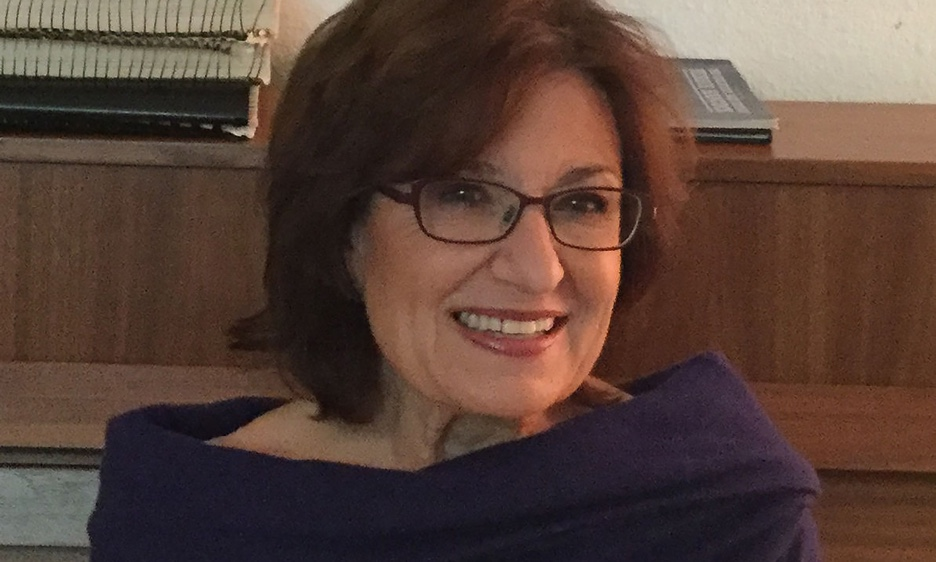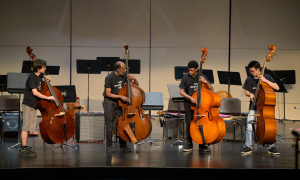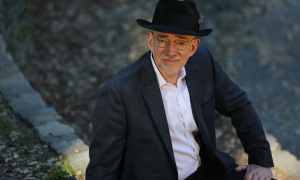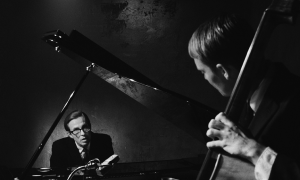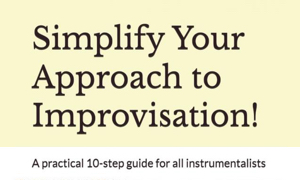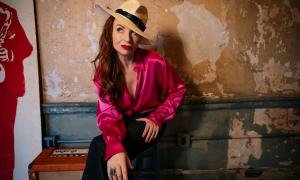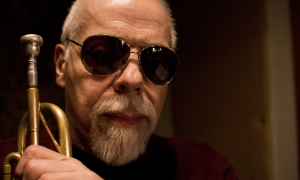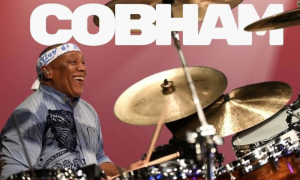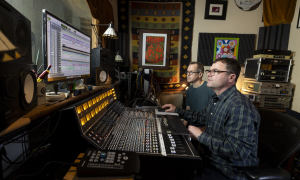As I continue to work with artists I love, I want to keep encouraging them to break the norms and set new standards in the genre.
—Barbara Brighton
Reflecting upon her extraordinary 25-year career as one of Los Angeles’ premiere and most respected jazz producers, Barbara Brighton connects powerfully with—and continues to wholeheartedly embody—an insightful quote from four-time Grammy winner Orrin Keepnews, a transcendent figure in 20th century jazz who set standards as as producer, label owner and journalist/liner notes writer.
“One of the most important things you can be as a producer,” Keepnews once said, “is being a psychologist.” Working with the legendary likes of Bill Evans, Cannonball Adderley, Wes Montgomery, Bobby Hutcherson and others, he believed that a successful producer needed to understand and work with the psychological aspects of the artists they collaborated with, helping them to create their best work.
When Barbara entered the studio to work on her first project, famed L.A. singer/songwriter Mark Winkler’s first bona fide straight—ahead album Easy the Hard Way, she brought over two decades of experience as a licensed psychotherapist, using talk therapy with hundreds of patients to help them address emotional and psychological issues. One of her roles in this capacity was navigating an understanding of their thoughts, feelings and behaviors and guide them towards making positive changes. Two years into her private practice, she began a 19-year-stint at a comprehensive Breast Center in Van Nuys as a therapist/consultant, which included leading a weekly support group. Even as she’s become one of the local jazz community’s most trusted producers, she’s kept her private practice thriving, although she now only sees clients two days a week.
Although she grew up playing classical and has fond memories of playing four hand piano with her dad, a professional jazz drummer who changed her world when he first played her “Rhapsody in Blue,” developing a successful second career as a jazz producer was the furthest thing from her mind when, as a young single mom seeking financial stability, she earned her graduate degree in psychology and subsequently launched her practice. She now sees her experiences as a psychotherapist, the personal bonds she developed with her patients and breakthroughs she achieved as essential groundwork for the relationships she has fostered over the years with L.A.’s top jazz artists and musicians.
“What I do more than anything is set the mood, so everybody feels safe, comfortable and appreciated, the same way I do with my therapy clients,” says Barbara, whose ever-expanding discography includes 10 critically acclaimed recordings with Winkler (including Old Friends with David Benoit and his latest release Hold On) and enthusiastically reviewed albums by indie jazz greats Judy Wexler (five), Gary Brumburgh (two), Julie Kelly (two), Beverley Church Hogan and Lauren White. She is currently in production on a single with the young jazz singer Tawanda (winner of the prestigious 2020 Sarah Vaughan Vocal Jazz competition) and working on an album with actress and emerging jazz vocalist Zuri Alexander.
“When Mark first suggested we work together, I was a bit intimidated, as an untested woman producer, but he felt like I supported him and wanted him to be successful. I quickly learned that the most important thing in working with any artist is to be supportive of their artistry and vision. I will always do everything in my power to make the project we’re working on the best you’ve ever done. Whoever you are, whatever you do, my job and goal is to achieve that for you and develop and improve on the songs and tracks you bring to the session.”
Barbara believes that the artists and musicians she’s collaborated with have learned to trust her because when they work together, she’s completely transparent. “I say what I think, but I try to do it in the kindest possible way. They may not like it, but they know that my intention is for their project to be next level sonically, aesthetically and emotionally. I always want the best for my artists. I don’t BS anybody, nor would I work with someone whose music or personality isn’t a good fit. The essence of a great jazz song or album is expression. You’re telling a story and need to connect with your audience–and of course that extends to the live setting as well. I’m there to make sure they sing the song in a way that will resonate with people.”
Beyond setting the overall tone of the recording sessions, Barbara is a stickler for details, helping her artists every step of the way as concepts and kernels of ideas grow into full-fledged songs, impactfully produced tracs. She works on all aspects, from helping narrow down which originals and/or standards to record to the style and arrangement of the piece and suggesting which musicians in the proverbial rolodex would serve it best.
Always developing a clear picture of how she wants a record to sound, she works on all the sonic intricacies, for instance, speaking up if the clarinet isn’t working and suggesting a soprano sax instead, and on and on until every detail is perfect. The engineers (like Talley Sherwood of Tritone Recording) who work with Barbara know she likes everything to either be recorded live or at least sound live, and she’s made mugs that say “REVERB” with a red slash through it. Under her guidance, if it’s not organic, it won’t fly.
“Another thing is, I’m not shy about speaking up about the things I like and things I don’t,” Barbara says. “Over the course of his recordings, for example, I help singers change their vocal approach in terms of controlling vibrato and in singing more from the heart. Or if a singer can’t reach a high note, there’s no reason to do what they can’t do if it doesn’t sound good. In those cases, we work towards finding a happy medium.”
After years of attending jazz shows and mingling with the musicians purely as a fan, Barbara’s formal immersion in the L.A. jazz scene began in the mid-90s upon the suggestion and encouragement of her late friend Ellen Cohn, a renowned jazz label executive. Barbara first met Mark Winkler at Ellen’s funeral, as he was a friend of Ellen’s who had also recorded several albums for one of the labels she worked at, Chase Music Group. The two became great friends over the next years as Barbara launched her umbrella company BJB Jazz Ventures. Its first project was putting on a memorial concert, in association with MAMA records, to honor Ellen at Catalina Bar & Grill. She went on to produce several jazz brunches and tribute concerts.
While attending the Jazz Times Convention in 1995, she connected with then rising jazz singer Kurt Elling’s producer and manager Bill Traut, who along with Blue Note Records hired her to help book successful local gigs, which led to more tour booking opportunities. One of her greatest experiences during this period was collaborating with Catalina Jazz Club’s owner Catalina Popescu on The Young Artist Jazz Series, which provided a venue for young local jazz artists to showcase their talents before a live audience. The series was a quick sensation whose showcases were soon booked a year in advance. To this day, Barbara maintains relationships with many of the musicians spotlighted in this series, many of whom became professionals who she has worked with on her projects.
Barbara’s first time behind the boards came when she was doing part-time A&R for MAMA Records, helping producer Doug Evans mix the Stan Kenton 50th Anniversary Back to Balboa album. “It was an incredible experience, and it gave me the bug,” she says. “It had been recorded live and there were some major problems as is often the case with outdoor live recordings. We did a lot of cutting and pasting and the album came out pretty good. I was very proud of the work I did and learned many things that came in handy when Mark approached me a few years later to work on Easy the Hard Way.”
“Everybody knows I’m deeply a mother at heart and I want everyone to do well,” Barbara adds. “I think the reason women can be successful in roles like these generally occupied by men is that we’re less competitive and more nurturing, more inclined to look out for the best interests of others rather than ourselves. I hope in some small way my success as a jazz producer can inspire other women, and in particular, younger women, to realize they can find a niche for themselves here. As I continue to work with artists I love, I want to keep encouraging them to break the norms and set new standards in the genre.”
~Jonathan Widran, JW Vibe
“One of the most important things you can be as a producer,” Keepnews once said, “is being a psychologist.” Working with the legendary likes of Bill Evans, Cannonball Adderley, Wes Montgomery, Bobby Hutcherson and others, he believed that a successful producer needed to understand and work with the psychological aspects of the artists they collaborated with, helping them to create their best work.
When Barbara entered the studio to work on her first project, famed L.A. singer/songwriter Mark Winkler’s first bona fide straight—ahead album Easy the Hard Way, she brought over two decades of experience as a licensed psychotherapist, using talk therapy with hundreds of patients to help them address emotional and psychological issues. One of her roles in this capacity was navigating an understanding of their thoughts, feelings and behaviors and guide them towards making positive changes. Two years into her private practice, she began a 19-year-stint at a comprehensive Breast Center in Van Nuys as a therapist/consultant, which included leading a weekly support group. Even as she’s become one of the local jazz community’s most trusted producers, she’s kept her private practice thriving, although she now only sees clients two days a week.
Although she grew up playing classical and has fond memories of playing four hand piano with her dad, a professional jazz drummer who changed her world when he first played her “Rhapsody in Blue,” developing a successful second career as a jazz producer was the furthest thing from her mind when, as a young single mom seeking financial stability, she earned her graduate degree in psychology and subsequently launched her practice. She now sees her experiences as a psychotherapist, the personal bonds she developed with her patients and breakthroughs she achieved as essential groundwork for the relationships she has fostered over the years with L.A.’s top jazz artists and musicians.
“What I do more than anything is set the mood, so everybody feels safe, comfortable and appreciated, the same way I do with my therapy clients,” says Barbara, whose ever-expanding discography includes 10 critically acclaimed recordings with Winkler (including Old Friends with David Benoit and his latest release Hold On) and enthusiastically reviewed albums by indie jazz greats Judy Wexler (five), Gary Brumburgh (two), Julie Kelly (two), Beverley Church Hogan and Lauren White. She is currently in production on a single with the young jazz singer Tawanda (winner of the prestigious 2020 Sarah Vaughan Vocal Jazz competition) and working on an album with actress and emerging jazz vocalist Zuri Alexander.
“When Mark first suggested we work together, I was a bit intimidated, as an untested woman producer, but he felt like I supported him and wanted him to be successful. I quickly learned that the most important thing in working with any artist is to be supportive of their artistry and vision. I will always do everything in my power to make the project we’re working on the best you’ve ever done. Whoever you are, whatever you do, my job and goal is to achieve that for you and develop and improve on the songs and tracks you bring to the session.”
Barbara believes that the artists and musicians she’s collaborated with have learned to trust her because when they work together, she’s completely transparent. “I say what I think, but I try to do it in the kindest possible way. They may not like it, but they know that my intention is for their project to be next level sonically, aesthetically and emotionally. I always want the best for my artists. I don’t BS anybody, nor would I work with someone whose music or personality isn’t a good fit. The essence of a great jazz song or album is expression. You’re telling a story and need to connect with your audience–and of course that extends to the live setting as well. I’m there to make sure they sing the song in a way that will resonate with people.”
Beyond setting the overall tone of the recording sessions, Barbara is a stickler for details, helping her artists every step of the way as concepts and kernels of ideas grow into full-fledged songs, impactfully produced tracs. She works on all aspects, from helping narrow down which originals and/or standards to record to the style and arrangement of the piece and suggesting which musicians in the proverbial rolodex would serve it best.
Always developing a clear picture of how she wants a record to sound, she works on all the sonic intricacies, for instance, speaking up if the clarinet isn’t working and suggesting a soprano sax instead, and on and on until every detail is perfect. The engineers (like Talley Sherwood of Tritone Recording) who work with Barbara know she likes everything to either be recorded live or at least sound live, and she’s made mugs that say “REVERB” with a red slash through it. Under her guidance, if it’s not organic, it won’t fly.
“Another thing is, I’m not shy about speaking up about the things I like and things I don’t,” Barbara says. “Over the course of his recordings, for example, I help singers change their vocal approach in terms of controlling vibrato and in singing more from the heart. Or if a singer can’t reach a high note, there’s no reason to do what they can’t do if it doesn’t sound good. In those cases, we work towards finding a happy medium.”
After years of attending jazz shows and mingling with the musicians purely as a fan, Barbara’s formal immersion in the L.A. jazz scene began in the mid-90s upon the suggestion and encouragement of her late friend Ellen Cohn, a renowned jazz label executive. Barbara first met Mark Winkler at Ellen’s funeral, as he was a friend of Ellen’s who had also recorded several albums for one of the labels she worked at, Chase Music Group. The two became great friends over the next years as Barbara launched her umbrella company BJB Jazz Ventures. Its first project was putting on a memorial concert, in association with MAMA records, to honor Ellen at Catalina Bar & Grill. She went on to produce several jazz brunches and tribute concerts.
While attending the Jazz Times Convention in 1995, she connected with then rising jazz singer Kurt Elling’s producer and manager Bill Traut, who along with Blue Note Records hired her to help book successful local gigs, which led to more tour booking opportunities. One of her greatest experiences during this period was collaborating with Catalina Jazz Club’s owner Catalina Popescu on The Young Artist Jazz Series, which provided a venue for young local jazz artists to showcase their talents before a live audience. The series was a quick sensation whose showcases were soon booked a year in advance. To this day, Barbara maintains relationships with many of the musicians spotlighted in this series, many of whom became professionals who she has worked with on her projects.
Barbara’s first time behind the boards came when she was doing part-time A&R for MAMA Records, helping producer Doug Evans mix the Stan Kenton 50th Anniversary Back to Balboa album. “It was an incredible experience, and it gave me the bug,” she says. “It had been recorded live and there were some major problems as is often the case with outdoor live recordings. We did a lot of cutting and pasting and the album came out pretty good. I was very proud of the work I did and learned many things that came in handy when Mark approached me a few years later to work on Easy the Hard Way.”
“Everybody knows I’m deeply a mother at heart and I want everyone to do well,” Barbara adds. “I think the reason women can be successful in roles like these generally occupied by men is that we’re less competitive and more nurturing, more inclined to look out for the best interests of others rather than ourselves. I hope in some small way my success as a jazz producer can inspire other women, and in particular, younger women, to realize they can find a niche for themselves here. As I continue to work with artists I love, I want to keep encouraging them to break the norms and set new standards in the genre.”
~Jonathan Widran, JW Vibe
For more information contact Mouthpiece Music.

